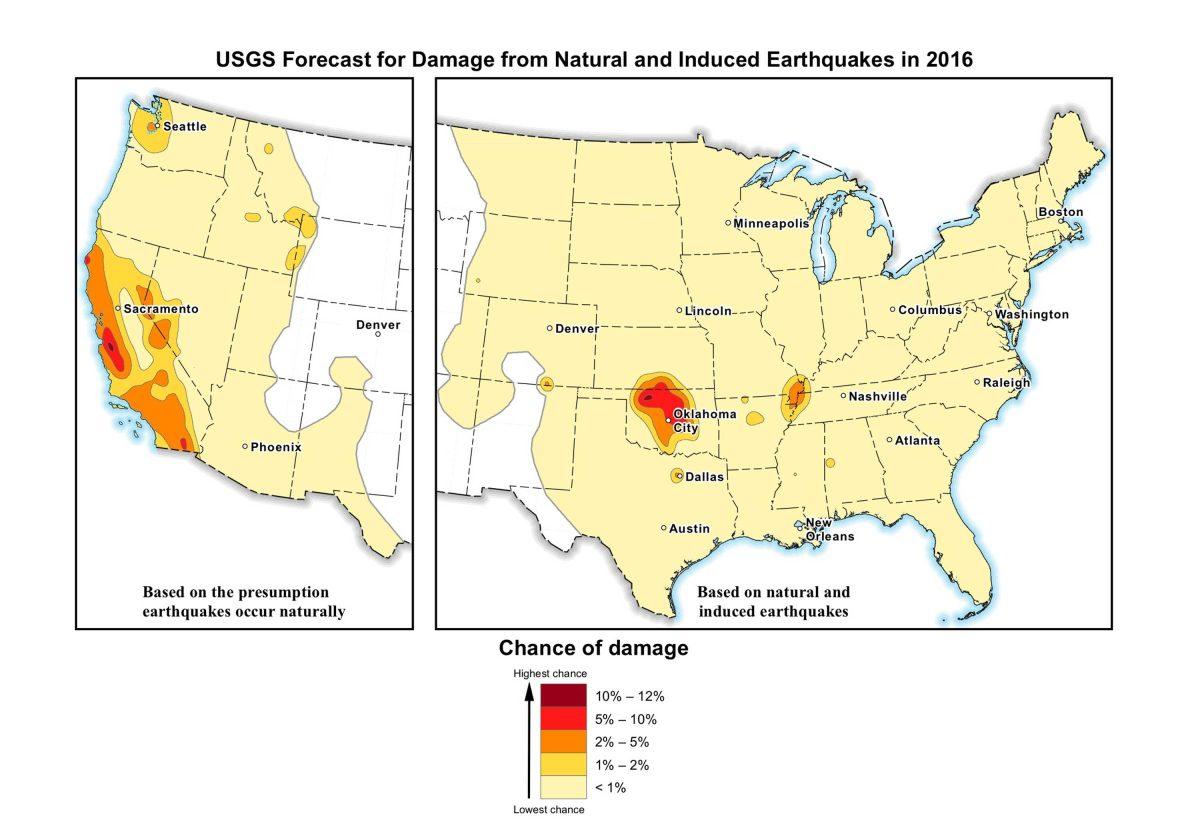The number of earthquakes that are directly or indirectly caused by horizontal oil well drilling is fracking ridiculous. Those who drill for oil and those who regulate their activity need to consider the consequences of such an environmentally destabilizing practice.
Fracking is the simplified term used to describe the process of drilling hydraulic fracture wells and the subsequent extraction of unrefined oil. For those of you who aren’t petroleum engineering majors, drillers will basically shoot massive quantities of fluid into the ground to make it easier to pump oil out.
At one point, this technique was the cutting edge of petroleum and natural gas drilling. It was so effective and unused, state legislators established a tax break for companies who used the method to get oil. These days, fracking is as common as the passed out guy with a black marker mustache on his face at a party.
Fracking is still shaking things up, but not in a good way. A study published Wednesday in Seismological Research Letters shows that fracking triggered 90 percent of 3.0 magnitude or greater earthquakes in Western Canada.
If and when an earthquake caused by fracking manages to do serious property damage, those affected may face a difficult time getting restitution to pay for the damages. Some insurance policies may have language in them that only covers “natural” earthquakes, or an “act of God.” In these cases, somebody whose home is unsafe to live in because of a frack-quake might have to sue the drillers, themselves.
That’s extremely difficult to do, for a number of reasons. First, some of those drillers may be multinational oil companies like Royal Dutch Shell or ExxonMobil, which have teams of lawyers waiting to drop more than 500 pages of legal documents on the victim’s doorstep to intimidate them.
Even if those trying to seek restitution make it past the flood of discovery requests and motions to dismiss, the odds are stacked against the victim. The scientist involved in the study cited earlier said fracking directly caused only one percent of those quakes.
It’s not just Canada. Fracking in Oklahoma is tied to an increased number of earthquakes, especially in the areas around fracking sites. Since fracking is common in Louisiana as well, this should scare residents of parishes where there is a lot of drilling.
Further, it’s exceedingly difficult, if not impossible, to establish legally-sufficient proof that a specific fracking operation caused a specific earthquake. Try proving it to a judge who doesn’t like to rule against oil companies, and you end up leaving victimized property owners on their own to pick up the pieces.
If you don’t believe me, take the example of secondhand smoke. Even though it’s scientifically proven repeated exposure to secondhand cigarette smoke has the potential to damage lungs, there’s no way somebody can successfully sue people around them who smoke.
Earthquakes aren’t the only problem with fracking. The high-pressure fluids injected into the ground often contain chemicals many consider toxic to humans and the environment, including acids, detergents and poisons, according to an opinion by geoscience professor Susan Brantley published in The New York Times.
If these chemicals get into drinking water, there could be serious health impacts for those who rely on it.
For those oil well operators trying to scrape together a living in a bad market, fracking is an invaluable tool for them to make money. However, the risks to the environment, the public and private property mean we need to find a better, cleaner and safer way.
Jack Richards is a 21-year-old mass communication senior from New Orleans, Louisiana.
Opinion: Fracking causes earthquakes, oil companies and regulators should reconsider
April 3, 2016
This image provided by the U.S. Geological Survey (USGS) shows the USGS forecast for damage from natural and induced earthquakes in the U.S. in 2016. Federal scientists say the chance of damaging earthquakes hitting east of the Rockies has increased significantly, much of it man-made as byproduct of drilling for energy. Oklahoma now has the nation’s highest with a 1 in 8 chance of damaging ground shaking in 2016, passing California. (U.S. Geological Survey via AP)
More to Discover








